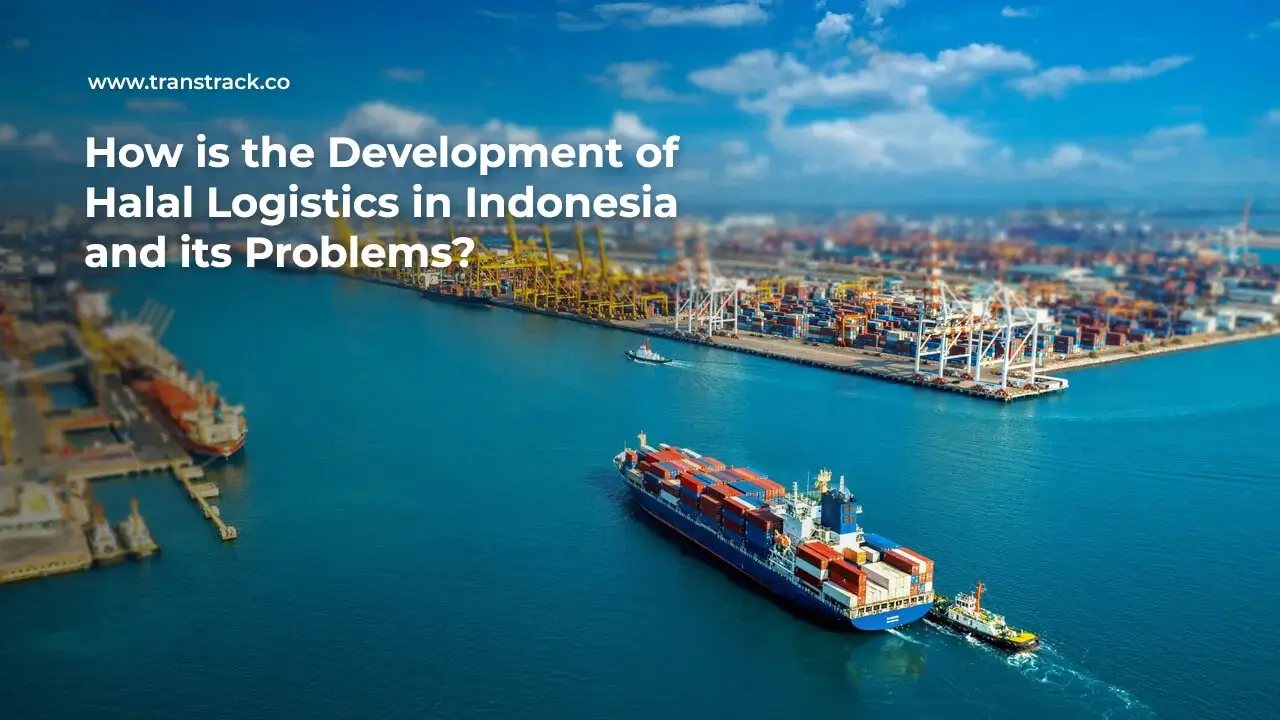How is the Development of Halal Logistics in Indonesia and its Problems?
Posted on July 16, 2025 by Nur Wachda Mihmidati

Halal logistics is the process of delivering goods and services that meet halal principles, which are in accordance with Islamic teachings. Halal principles include aspects such as processing, production, storage, transportation, and distribution, as well as the use of materials and processes that do not contain haram or non-halal elements.
This principle also involves the process of inspection and supervision of the product and its production process, from raw materials to ready-to-ship goods, to ensure that there are no haram or non-halal elements. This is done to ensure the halalness and hygiene of the products, and to meet the increasing requirements and expectations of Muslim consumers.
As part of the halal industry, this principle also aims to promote fair and responsible trade, and advance the halal economy globally. Get to know more in this TransTRACK article!
Benefits of Halal Logistics Implementation
The implementation of this principle has several benefits, including:
Meet the growing demands of Muslim consumers for halal and clean products and services
The increasing awareness of Muslim consumers about the halalness and hygiene of products and services has increased the demand for halal products. By implementing this principle, companies can meet these consumer demands and increase their trust in brands and products.
Increase reputation and consumer confidence in products and brands that practice Halal Logistics
In business, reputation and trust are key factors to win consumer confidence. Implementing this principle can help companies to improve reputation and consumer trust in the products and brands produced.
Assist companies to fulfill halal requirements and regulations, and obtain halal certification.
The implementation of this principle can help companies meet the halal requirements and regulations set by the halal authority. In addition, companies that implement this principle can also obtain halal certification, which can open up new market opportunities and enhance the company’s reputation.
Ensure product safety and quality throughout the production, storage, transportation, and distribution processes
This principle involves strict inspection and supervision of ingredients, processes and products during the entire cycle of production, storage, transportation and distribution. This ensures that products are halal and clean and do not contain ingredients that are detrimental to human health.
Improved efficiency and cost savings through a more structured and planned production process
The implementation of this principle can help companies to optimize production processes and improve efficiency. This can reduce production costs and increase company profits.
Minimize the risk of misuse of non-halal ingredients and processes during the production and distribution process.
This principle involves close monitoring of the entire production and distribution process to ensure that no non-halal ingredients or processes are used. This can minimize the risk of misuse of non-halal ingredients and processes that can damage product quality and company reputation.
Support the growth of the halal industry globally and open wider market opportunities for halal products and services.
The implementation of this principle can help promote the halal industry globally and open up wider market opportunities for halal products and services. This can strengthen the company’s position in the market and increase their profits.
Increase public awareness and understanding of the importance of halal products and services and increase their involvement in promoting the halal industry.
The implementation of this principle can increase public awareness and understanding of the importance of halal products and services. This can strengthen the position of the halal industry in the eyes of the public and motivate them to get involved in promoting the halal industry.
In addition to the above benefits, implementing this principle can also help companies to minimize the legal and reputational risks that can arise from violating halal requirements. By implementing this principle, companies can ensure that they comply with established halal requirements and regulations and avoid potential legal and reputational issues that could damage their business.
Thus, the implementation of this principle not only benefits companies financially, but also strengthens reputation and consumer confidence, increases public awareness of the importance of halal products and services, and supports the growth of the halal industry globally.
The difference between halal logistics vs conventional logistics
In an industry that increasingly demands transparency and adherence to religious standards, it is important to understand the fundamental differences between halal logistics and conventional logistics. This difference not only impacts the way goods are managed, but also on reputation and consumer trust.
Differences between Halal Logistics vs Conventional Logistics
| Aspects | Halal Logistics | Conventional Logistics |
| Purpose | Maintain the halalness and purity of products throughout the supply chain | Cost, time, and quality efficiency of distribution |
| Product Handling | Separated from non-halal and unclean products | Mixed without halal-non-halal restrictions |
| Certification | Requires halal certification from an authorized authority | Does not require halal certification |
| Supply Chain | All parties must comply with halal principles | Focus on smooth and efficient distribution |
| Infrastructure | Dedicated warehouse and transportation or with halal zones | No separation of zones or vehicles |
| Cross Contamination | Strictly avoided (there is a sertu/samak SOP) | Not a major concern if not harmful |
| HR & Training | Halal compliance training provided | General technical and operational training |
| Audit & Monitoring | Periodic halal audits and halal traceability system | General operational and managerial oversight |
Why is Halal Logistics Increasingly Important?
As consumer awareness increases and the global halal market expands, halal logistics now plays a strategic role in maintaining product integrity from producer to end consumer. Here are some of the main reasons why halal logistics is becoming increasingly important:
- Global Halal Industry Growth The halal industry is now not just the preserve of Muslim-majority countries. The value of the global halal market is estimated to reach trillions of dollars, covering food, cosmetics, pharmaceuticals, and logistics. This growth creates the need for a distribution system that ensures halal integrity from upstream to downstream.
- Muslim consumers are increasingly aware of the importance of halalness not only in the product, but also in the logistics process. They demand full transparency, including in the storage, transportation, and distribution of products.
- Trust is key in the halal industry. Without shariah-compliant logistics support and without official certification, halal products risk losing market trust. Therefore, halal logistics is a strategic tool to maintain reputation and open global markets.
Business Impact of Halal Logistics Implementation
Adopting halal logistics is not just a form of compliance, but a long-term business strategy. The implementation of a shariah-compliant logistics system brings various positive impacts to the sustainability and competitiveness of the company, such as the following:
- By ensuring halal logistics processes, companies build stronger trust from Muslim consumers, who are a large and loyal market.
- Meeting Regulations in Export Destination Countries. Many countries such as Malaysia, United Arab Emirates, and Brunei require halal standards to be included in logistics. This implementation eases market access and speeds up the export process.
- Halal logistics strengthens a company’s image as an ethically and religiously responsible entity. It enhances competitiveness and adds brand value in the eyes of global consumers.
Halal Logistics Support Technology
To maintain halal integrity consistently throughout the supply chain, sophisticated and integrated technology support is required. Here are the key technologies that support the implementation of halal logistics:
- IoT and Sensors for Temperature & Contamination Monitoring Real-time sensors enable monitoring of temperature, humidity, and potential cross-contamination in transportation and storage, ensuring products remain in halal and thayyib conditions.
- Blockchain for Halal Traceability Blockchain technology brings transparency and permanent record keeping at every stage of logistics, from raw material sourcing to final distribution, to guarantee the halalness of the supply chain.
- Integrated Logistics Management System Platforms such as WMS, TMS, and FMS facilitate efficient and compliant management of halal goods flow, including auditing and tracking.
- Halal Logistics Platform TransTRACK A dedicated platform that combines real-time tracking, digitization of halal documents, to route and warehouse segregation, providing an end-to-end solution to support halal logistics operations.
Development of Halal Logistics Management in Indonesia
Halal logistics management is part of the growing halal industry in Indonesia. Here are some of the latest developments in Halal Logistics management in Indonesia:
Establishment of the Indonesian Halal Logistics Standardization Agency (BSHLI)
In 2020, the Indonesian government through the Ministry of Transportation and the Ministry of Religious Affairs established the Indonesian Halal Logistics Standardization Agency (BSHLI). BSHLI is tasked with developing operational standards and procedures for halal logistics, as well as conducting halal certification for logistics products and services.
Increased market demand for Halal Logistics
Market demand for halal products and services continues to increase in Indonesia, including for halal logistics. This has encouraged many logistics companies to implement Halal Logistics management to meet consumer demands and increase their trust.
Provision of Halal Logistics training and certification
Many training and certification institutions have provided halal logistics training and certification programs in Indonesia. This helps logistics companies to acquire the necessary knowledge and skills in implementing Halal Logistics management.
Emergence of halal logistics companies
There are several logistics companies that specialize in halal logistics services in Indonesia. These companies provide halal and clean transportation, storage and distribution services, and have obtained halal certification.
Government involvement in halal industry development
The Indonesian government continues to develop policies and regulations to support the growth of the halal industry in Indonesia, including for Halal Logistics management. This helps increase public awareness and understanding of the importance of halal products and services, as well as opening up wider market opportunities for halal products and services.
With the above developments, Halal Logistics management in Indonesia is growing and becoming increasingly important in the halal industry. Logistics companies that implement halal logistics management have a better chance of winning consumer trust and earning greater profits in a market that is increasingly in demand.
Problems that become obstacles to the implementation of Halal Logistics
Although the benefits of implementing this principle are enormous, there are several problems that become obstacles in its implementation. Here are some of the problems commonly faced in implementing this principle:
Absence of clear regulations
Regulations related to this principle are still unclear and sometimes ambiguous in some countries, including Indonesia. This can be confusing and make it difficult for logistics companies to understand and implement halal requirements appropriately.
Limited resources
Implementing this principle requires sufficient resources, both in terms of financial, human resources, and technology. Many logistics companies, especially small and medium-sized ones, may not have sufficient resources to fulfill halal requirements.
Problems in the supply chain
Complex supply chains in the logistics industry make it difficult to ensure the entire production and distribution process complies with halal requirements. For example, in the food industry, the ingredients used in the production process may not always be halal, and it is difficult to ensure that all such ingredients have been obtained from halal sources.
Lack of awareness and understanding
Lack of awareness and understanding of the importance of this principle among logistics companies and the general public is also an obstacle to its implementation. Many logistics companies may not fully understand the benefits and importance of implementing this principle, while the general public may not understand the requirements and importance of halal products and services.
Halal certification issues
Halal certification can be a difficult issue for logistics companies, especially for those with international branches. Some countries may have different halal requirements and it may be difficult to fulfill all of them.
By addressing these issues, the implementation of this principle can become more effective and can help strengthen the halal industry as a whole. One of the efforts that can be made is to increase regulation and awareness among logistics companies and the general public, and improve access to resources and training to ensure effective and efficient implementation of this principle.
In implementing this principle, technology also plays an important role in ensuring the safety and halalness of products and services. One of the technology solutions that can help logistics companies monitor and ensure product safety and halal services is the Halal Log from TransTRACK.

Using this technology, logistics companies can monitor and control their entire fleet and loads in real-time, and ensure that all halal requirements are met at every stage of delivery and distribution. In addition, by using Halal Log, logistics companies can optimize their logistics operations and improve their overall efficiency and effectiveness.
Therefore, TransTRACK’s Halal Log can be the right choice for logistics companies who want to ensure the implementation of Halal Logistics effectively and efficiently.
Topic :
Recommended Articles

Improving Fleet Safety through Traffic Accident Prevention with ADAS
Featured Product | February 12, 2026
 Bahasa Indonesia
Bahasa Indonesia







